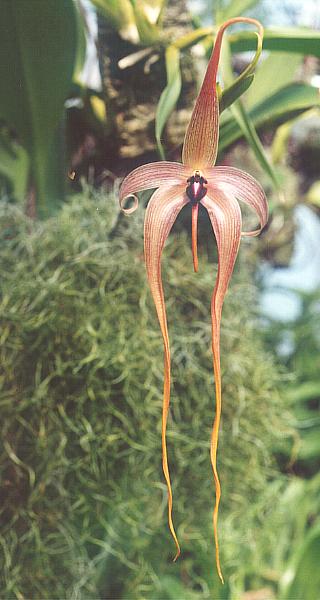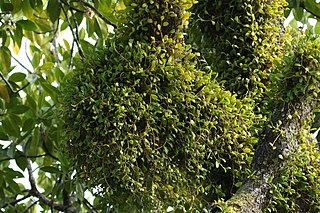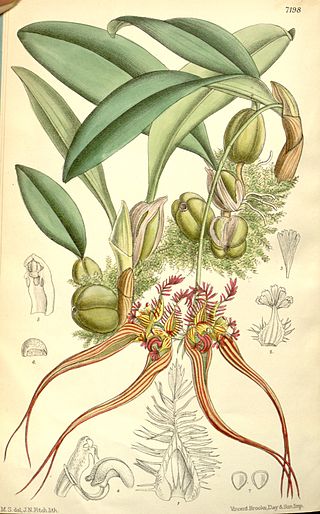
Bulbophyllum is a genus of mostly epiphytic and lithophytic orchids in the family Orchidaceae. It is the largest genus in the orchid family and one of the largest genera of flowering plants with more than 2,000 species, exceeded in number only by Astragalus. These orchids are found in diverse habitats throughout most of the warmer parts of the world including Africa, southern Asia, Latin America, the West Indies, and various islands in the Indian and Pacific Oceans. Orchids in this genus have thread-like or fibrous roots that creep over the surface of trees or rocks or hang from branches. The stem is divided into a rhizome and a pseudobulb, a feature that distinguished this genus from Dendrobium. There is usually only a single leaf at the top of the pseudobulb and from one to many flowers are arranged along an unbranched flowering stem that arises from the base of the pseudobulb. Several attempts have been made to separate Bulbophyllum into smaller genera, but most have not been accepted by the World Checklist of Selected Plant Families.
Bulbophyllum rimannii is a species of orchid. Previously known as Acrochaene rimannii, it was placed within Bulbophyllum in 2014. It is native to Sikkim, Bhutan, Assam, Myanmar and Thailand.

Bulbophyllum biflorum is a species of orchid. This species was found in Java, Sumatra, Bali, Borneo, the Philippines, and the Thai and Malaysian peninsula. The flower size is 7.5 cm long.

Bulbophyllum acuminatum is a species of orchid in the genus Bulbophyllum. This orchid is commonly known as the tapering flower bulbophyllum and can be found in Southeast Asia near Thailand, Burma, and Malaysia.

Bulbophyllum apodum is a species of orchid in the genus Bulbophyllum. It bears a 12–14 cm inflorescence with around 40 small fragrant white flowers on it. It is native to Sikkim, Borneo, China, Malaysia, Thailand, the Philippines, Vanuatu, and Vietnam.

Bulbophyllum clandestinum is a species of orchid in the genus Bulbophyllum. This orchid grows long hanging rhizomes from which it produces tiny pseudobulbs that each bear one leaf. Flowers are born on each node, they are 3–5 cm in length and are a creamy colour. It is native to Borneo, Laos, Malaysia, Myanmar, Thailand, the Philippines, and Vietnam.

Bulbophyllum dayanum is a species of orchid in the genus Bulbophyllum found in India, Myanmar, Cambodia, Vietnam and Thailand.
Bulbophyllum eublepharum is a species of orchid in the genus Bulbophyllum. Chromosome count is 2n = 38. Plants are epiphytes.

Bulbophyllum lepidum, is a species of orchid, in the subfamily Epidendroideae and the genus Bulbophyllum, with the common name: Venus' fan bulbophyllum.

Bulbophyllum lasiochilum, commonly referred to as "The Shaggy Lipped Bulbophyllum", is a species of orchid in the genus Bulbophyllum. It is found in India, Myanmar, Thailand and Malaysia in wet or seasonally dry forests, and blooms in the fall.
Bulbophyllum oligoglossum is a species of orchid in the genus Bulbophyllum from Myanmar.

Bulbophyllum ovalifolium is a species of orchid in the genus Bulbophyllum.
Bulbophyllum reichenbachii is a species of orchid in the genus Bulbophyllum, found in northern Burma. The orchid grows on the trunks of trees, forming clumps.
Bulbophyllum sillemianum is a species of orchid in the genus Bulbophyllum. The species is found in Myanmar.

Bulbophyllum wendlandianum is a species of orchid in the genus Bulbophyllum.
Bulbophyllum crabro, commonly called "Kam Pu Ma" in Thai, is a small orchid that grows as an epiphyte or is sometimes found as lithophyte. It grows in rainforests 1,600-2,000 m above sea level. It was formerly known as Monomeria barbata and was the type species of the genus Monomeria, now synonymous with Bulbophyllum. It is used in traditional Chinese medicine for treating coughs, pulmonary tuberculosis and trauma.

Dendrobieae is a tribe in the subfamily Epidendroideae, in the family Orchidaceae. The Dendrobieae are mostly tropical, epiphytic orchids which contain pseudobulbs.
Nadaw is the ninth month of the traditional Burmese calendar.

Bulbophyllum drymoda is a species of orchid in the genus Bulbophyllum. It was formerly the type species of the genus Drymoda, now synonymous with Bulbophyllum. It is native to Myanmar, Thailand, and Vietnam.

Bulbophyllum sect. Drymoda is a section of the genus Bulbophyllum.












